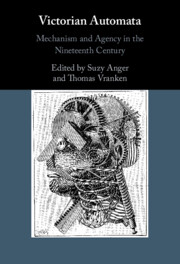Book contents
- Victorian Automata
- Victorian Automata
- Copyright page
- Contents
- Figures
- Contributors
- Introduction
- An Afterthought on Victorian Automata as Afterthought (and Signifier)
- Part I Mechanical Automata
- Part II Automatism
- Chapter 4 The Dialectic of Automatism and Free Will
- Chapter 5 The Poetry of Conscious Automatism
- Chapter 6 “No Purpose, Heart or Mind or Will”
- Chapter 7 Creative Trollope
- Chapter 8 Darwin and Agency – Intention or Automatism?
- Part III Literary Genre and Popular Fiction
- Part IV Interactions
- Index
Chapter 4 - The Dialectic of Automatism and Free Will
from Part II - Automatism
Published online by Cambridge University Press: 15 March 2024
- Victorian Automata
- Victorian Automata
- Copyright page
- Contents
- Figures
- Contributors
- Introduction
- An Afterthought on Victorian Automata as Afterthought (and Signifier)
- Part I Mechanical Automata
- Part II Automatism
- Chapter 4 The Dialectic of Automatism and Free Will
- Chapter 5 The Poetry of Conscious Automatism
- Chapter 6 “No Purpose, Heart or Mind or Will”
- Chapter 7 Creative Trollope
- Chapter 8 Darwin and Agency – Intention or Automatism?
- Part III Literary Genre and Popular Fiction
- Part IV Interactions
- Index
Summary
The chapter views automatism in the light of the Victorian emphasis on the value of free will and individual responsibility. Daily life involved repeated practical synthesis of contradictory judgments about the determined, or automatic, and moral sources of action. Criminal court cases in which there was a defense of insanity exemplified the issues at stake in relating the disordered brain and the moral will. In the Victorian period, medical experts began to play a large part in legal judgments about insanity and criminal responsibility, and they articulated evidence for the involuntary, or automatic, form of insane actions. Public interest in these issues preceded and informed debate about automatism in philosophy and science. The chapter uses a spectacular 1854 case of multiple child murder by the children’s mother to shape discussion of the wider issues. The case both shows the complexity of social issues touching on automatism and offers insight into the imagination that accompanied Victorian fears about automatism replacing free will.
- Type
- Chapter
- Information
- Victorian AutomataMechanism and Agency in the Nineteenth Century, pp. 89 - 106Publisher: Cambridge University PressPrint publication year: 2024



